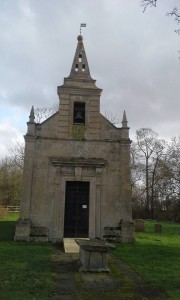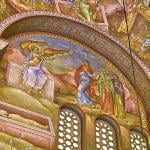As an organic farmer, I am keenly aware of the how bodily death is implicated in the eco-system, and therefore in our bodily relationship with the millions of other organisms thriving and surviving and perishing constantly around us, those with whom we consciously interact and those of which we are unaware. A plant requires a living soil – teeming with microbes – in order to grow, and yet a living soil requires death and decay. Composting is a condition for good growing. Rot is necessary.
So I would like to greet you, readers of my first post here, with a short meditation on how we engage with death.
Very recently I had the opportunity to visit the tiny church of St. John’s, in Little Gidding, familiar to my fellow literature geeks as one of the sites for T.S. Eliot’s Four Quartets. It is a grey church dappled with lichens, in a green space, surrounded by keeling crooked tombstones, and the first few snowdrops of the year. “Little Gidding” is, of course, the poem in which Eliot alludes directly to the famous quotation from Julian of Norwich:
…And all shall be well and
All manner of thing shall be well…
IN times of luxury and contentment it is easy enough to believe Julian’s words. But the challenge of the statement, and of the poem, and of the church in the graveyard is to understand how all shall be well amidst civil war and violence and death. “Little Gidding” is a poem in which historical strife, the flight of the “broken king” Charles I, who refuged near St. John’s church, is tethered to the stillness of eternity, between one wave and the next. The sense that all is not lost is reiterated in the snowdrops, in the lichens on the church, in the stillness, but really there is no political solution nor human code which ensures anything. This could be after all the madness of poets. I have no proof that it is not. If we are looking globally and not simply through the brief haze of contentment after a particularly pleasing meal or yoga session, we ought to see that Julian’s statement is possibly commpletely insane. All is not well. It never has been. Death has fed death and this is not pleasant. Belief that all shall be well requires something beyond the platitudes of first-world philosophies.
What one finds in St. John’s, and in T.S. Eliot’s poem, is not a promise of luxury or contentment but a reminder of the crisis of violence through human history, a violence that has been perpetuated precisely by those movements that have sought to bring about utopia – whether by Cromwell’s Roundheads or by any other group religious or secular, and intent upon the slaying of the scapegoat, whether king or erring woman or innocent animal. In our attempt to escape death we end up becoming dealers of death.
Politically, as dealers of death, we have done a very fine job of pretending that death is not death. Phenomenologically we blind ourselves. How else could we be content with the “collateral damage” necessary for us to carry on with our utilitarian schemes of capitalist exploitation of the earth, animals, the unborn, the poor, the racially other, the inconveniently located civilian? We have a whole gamut of euphemisms for death. Pomp and circumstance and flags and memorials hide its reality.
Dualism is a veil: we politicize the deaths of public figures, so that we forget that what has happened is that a living body has gone through a terrifying transmutation from being a person to being a collection of cells to feed microbes (if microbes can even get into an expensive sealed coffin). We even pretend that the body itself was never the person, but only a container for the person, falling back on a sloppy Platonism that conjures an angel springing its cage and winging heavenward, away from the corruption of material being.
Capitalism is a veil: the view of the person as a unique being is replaced with an idea of the person as a kind of machine that produced a kind of product; death is mourned or celebrated depending on whether we liked or disliked the product. A beloved artist is mourned because we will miss the product. An unpopular politician is not mourned because we’re glad to be rid of the product. Public disputations on the seemliness of this are a fine civic distraction from the reality of decay.
Even modern agriculture is a veil: compost is considered unseemly, so instead we poison the earth with chemical fertilizers. Nothing can grow in these soils.
It is terrifying to pull the veil aside and consider death frankly, to face history and its violence without the soothing bromides of first-world pop philosophy, whether of bubbly optimism or smooth cynicism. Or aestheticism: that’s a veil, also. It’s a mistake to think that what Little Gidding (the poem or the place, the poem in the place) has to offer is meaningful simply because of its beauty. The snowdrops around the grave are beautiful, and that’s very nice for us tourists passing by, but fairly inconsequential to anyone who kneels in mourning beside that grave. There’s no real comfort for Echo in Narcissus having become a flower. Compost is good for poetry but if poetry is all there is, we are fools.Henry James called death “that distinguished thing” but, as it turned out, he wasn’t really dying when he said it.
What the pilgrim finds in the little church is perhaps most meaningful because it does not lie to us with easy answers. Julian’s statement that “all shall be well” may be complete lunacy. Or, yet, it may be an affirmation that the thing we are searching for is there, though we have not yet found the gate that opens to it. Do not cease from exploration.


















